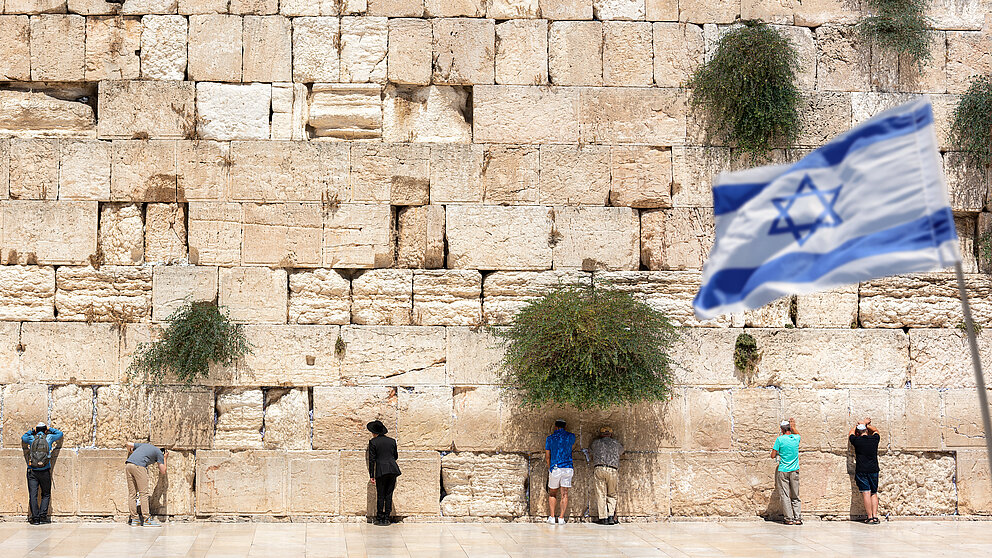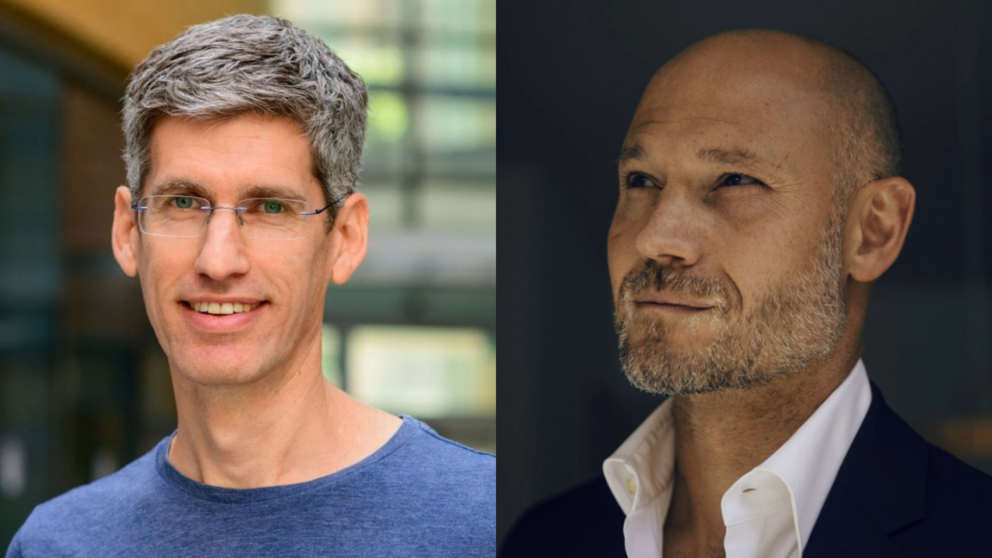
Contact
Press, Communications and Marketing
Tel.: +49 228 833-144
Fax: +49 228 833-441
presse[at]avh.de

“Let us not be mere bystanders. Let us be advocates for justice, equality and peace, and let us actively champion a profound respect for the dignity of human life – all human life,” is the wish expressed in an open letter from Israel’s science organisations to the academic world. The Humboldt Foundation shares this view, has condemned the brutal attack by Hamas and stands in solidarity with its friends in Israel. “I am very concerned about anti-Semitism and the situation in the Middle East. I call on all members of the Humboldt Family, wherever necessary, to stand up for the safety of Jewish colleagues and students of whatever nationality,” said the Foundation’s President, Robert Schlögl. The Humboldtians Assaf Gal (Rehovot, Israel) and Omri Boehm (New York, USA, currently Munich, Germany), report on the consequences of the Hamas massacre.
Humboldt Foundation: Dr Gal, Rehovot is just 50 km from Gaza as the crow flies. What effect has 7 October had on your daily work at the Weizmann Institute and the science system in Israel in general?
Assaf Gal: There are ten people in my research group, five of them are now abroad, two have been drafted, which leaves just three of us. At the moment, we are still experiencing alarms roughly every other day due to rocket fire. So, we can’t work normally. Many students have been called up, and shortly after the attack as few people as possible were supposed to be on the road. The start of the academic year in Israel has been postponed because many students are away and many institutions don’t have enough shelters. But in December it is supposed to resume.

Assaf Gal is a researcher at the Weizmann Institute of Science in Rehovot, exploring the mechanisms by which algae form complex inorganic matter whose spectacular mineralogical morphology surpasses any man-made material. From 2015 to 2017, Gal was a Humboldt Research Fellow at the Max Planck Institute of Molecular Plant Physiology in Potsdam.
The German-Israeli philosopher, Omri Boehm, is an Associate Professor at the New School for Social Research in New York, where Hannah Arendt was a teacher. From 2015 to 2018 he was a Humboldt postdoctoral fellow at the Ludwig Maximilian University of Munich where he is currently visiting once again. Boehm has written, inter alia, the book Israel – a Utopia that was published in 2020.

Professor Boehm, how do you assess the consequences of the Hamas attack on Israeli society?
Omri Boehm: Israel was always perceived as a homeland. Questions of safety were always under doubt, we always thought of ourselves as living in a dangerous place, in a fraught reality, to be honest, not completely believing that ourselves and subscribing, rather, to the thought that our military power can protect us. The main significance of the homeland was not the feeling of security, but rather that we will be protecting ourselves. And this feeling is indeed undermined, and it will take a moment to restore. I fear that people seek to satisfy the need to restore it also by showing an aggressive response in Gaza.
What reactions did you experience after the attack?
Assaf Gal: We received a lot of supportive post, letters of sympathy from all over the world, for example from the Max Planck Society in Germany. But some of the things we heard from America were very disturbing. And it really hurts that on esteemed university campuses in America pro-Palestinian demonstrations were merged with fake-news and anti-Semitic slogans. Many of Israeli academics found themselves spending half of their time fighting false narratives on various social media channels.
Do you think that it was an inadequate act when UN Secretary-General Guterres stated that the attack “did not happen in a vacuum?“
Omri Boehm: I think that that was an excellent example of contextualising without thereby justifying. Guterres was very clear in speaking of Hamas’ crimes; and he was very clear that the context ought to be understood. Denying the possibility of contextualisation is subscribing to the dangerous idea that the situation cannot be addressed politically and rationally, but only by power. Those who went against Guterres contextualisation are too often those who are outraged about the lack of condemnation of Hamas’ act, but fail themselves to speak clearly of Israeli accountability to international law – in the current war, and in the broader Israeli-Palestinian context.
Assaf Gal: There is no black and white in this conflict, but many grey areas that have to be considered and weighted. I talked to a 17-year-old I know who, out of anger, spoke recklessly and welcomed the death of innocent people on the Palestinian side. We must make the radical people, who are often young and think in black and white, here and elsewhere, understand the complexity and keep the conversation going. I welcome the science organisations’ rational approach and demand that every life deserves respect.
“Let us not be mere bystanders. Let us be advocates for justice, equality and peace, and let us actively champion a profound respect for the dignity of human life – all human life,” was the call of Israel’s science organisation, and as we witness the situation in Gaza, we must really emphasise: all human life.
Professor Boehm, you are currently experiencing the way the events in Israel and Gaza are affecting German society. How do you view the German position?
Omri Boehm: Germany finds itself in a very difficult spot. On the one hand, it has responsibilities towards Israel, and those have to be protected. On the other hand, it has a responsibility to international law. Both stem from universal commitments as well as from Germany’s duties, given its past. Both are necessary to keep Germany’s concept of citizenship open beyond just that of so-called “bio-German” national identity. The danger of anti-Semitism – which is not the same as anti-Zionism – does challenge that openness. In my view, making clear the responsibility to Israel and to international law are important to foreign policy just as much as they are for Germany’s own concept of citizenship.
What kind of solution could there be after the war against Hamas? How could Israeli and Palestinians manage to coexist?
Omri Boehm: It is very difficult to see how to go forward. The one thing that is becoming less and less obvious, but has to be absolutely preserved, is the commitment to a political resolution of the conflict, rather than a military one. Insofar as this minimal hope is in question, I support even the lip-service that’s paid by some to the two-state solution, which I’ve held for a long time as passé: as long as people proclaim their commitment to two states, they proclaim the commitment to a solution that respects the right of both people to live in this territory. As to reality, I fear that two states are not more likely now than before – hence that either some form of federation would be at least in the process of creating, something that seems entirely utopian now; or that violence of the sort that we saw on October 7th and seen since will end up with mass expulsions.
Assaf Gal: As a scientist, I think we need to be humble and realise that a comprehensive solution is not realistic today. The military conflict will eliminate Hamas as a major threat to Israel, but the political situation is complicated on so many levels that even a temporary arrangement that will provide hope and safety for the people in and around Gaza will be an achievement. Moving towards such reality is difficult as so many people on both sides are desperate and reluctant to look into the future. As a human, I always prefer to be optimistic and hopeful. The radical changes in the relations between Germans and Jews over the last century are testimony to the fact that people can, and should, make a difference.
